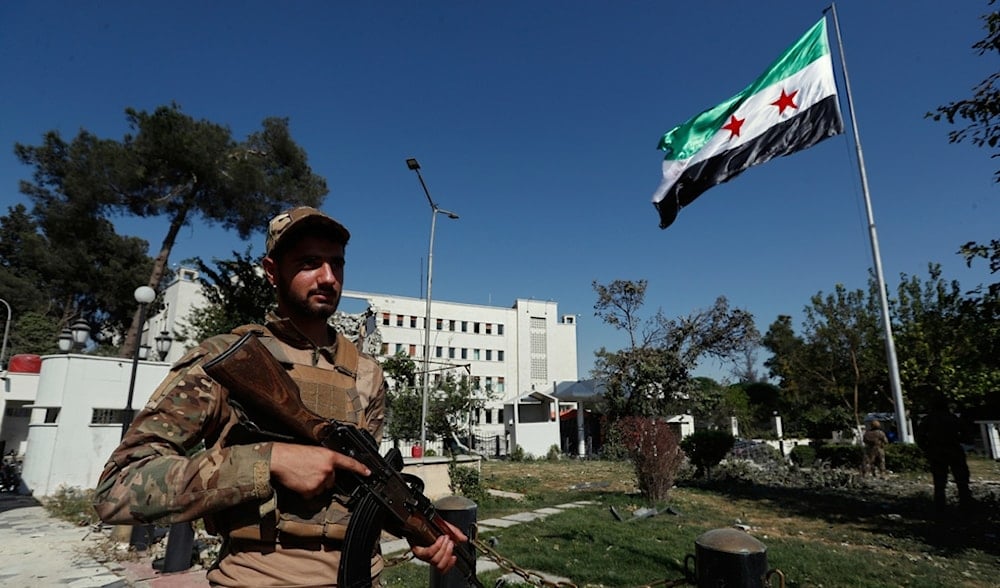Nearly 10,000 killed in Syria since al-Sharaa took power: SOHR
Over 9,800 have been killed in Syria since the former regime's collapse, as violence, field executions, and lawlessness spread.
-

Syrian soldiers raise the Syrian national flag in front of the Syrian Defense Ministry building, which was heavily damaged by Israeli airstrike, in Damascus, Syria, Saturday, July 19, 2025. (AP)
The Syrian Observatory for Human Rights (SOHR) estimated that 9,889 people have been killed across Syria since the fall of the former regime, as the country continues to grapple with a dangerous political and security vacuum.
The absence of a centralized authority has left the country in a state of fragmentation, with the country now facing significant challenges, particularly in terms of security and the deteriorating economy.
The regime’s fall was immediately followed by widespread chaos across most provinces, according to the SOHR, creating fertile ground for opportunistic actors to seize public property and amass personal gains at the expense of the common good.
Amid this disorder, Syria has witnessed a sharp rise in violent crime, targeted killings, and sectarian or politically motivated massacres. Many of these violations have been systematic, not random, and appear designed to deepen societal divisions, which poses a direct threat to any future effort to build a modern, democratic state grounded in justice and equality.
Alongside these atrocities, dozens of cases of torture and deaths in prisons affiliated with different armed groups continue to be reported, compounding fears of a growing culture of impunity.
Nearly 80% of casualties are civilians
According to the data obtained by the Syrian Observatory, 7,449 civilians were killed, among them 396 children and 541 women, between December 8, 2024, and August 6, 2025, highlighting the severe vulnerability of non-combatants in the ongoing unrest.
These figures illustrate the dire security reality in the country and the lack of effective state protection for civilians. Killings were carried out by a variety of local and foreign actors, amid a broader collapse of public order.
Monthly breakdown of death toll:
- Dec 8–Dec 31, 2024: 2,354 deaths (1,894 civilians)
- January 2025: 1,122 deaths (679 civilians)
- February 2025: 603 deaths (435 civilians)
- March 2025: 2,644 deaths (2,069 civilians)
- April 2025: 452 deaths (352 civilians)
- May 2025: 428 deaths (295 civilians)
- June 2025: 391 deaths (360 civilians)
- July 2025: 1,733 deaths (1,225 civilians)
- Aug 1–6, 2025: 162 deaths (140 civilians)
Documented causes of civilian deaths:
- Indiscriminate gunfire & clashes: 320
- Unknown circumstances: 1,750
- Mines & explosive remnants: 58
- Assassinations: 381
- Airstrikes and shelling by Turkish forces: 129
- Israeli airstrikes: 32
- Torture in various prisons: 53
- ISIS attacks: 34
- Attacks by SDF and affiliated forces: 18
- Field executions based on identity: 2,535
The deadliest month was March 2025, when SOHR documented 1,726 field executions, most of them carried out during attacks on security checkpoints in Syria’s coastal regions. These killings were primarily based on political or sectarian identity and carried out using brutal methods. In total, 2,535 identity-based executions have been documented since December 2024.
Executions by month:
- Dec 8–Dec 31, 2024: 141
- January 2025: 74
- February 2025: 60
- March 2025: 1,726
- April 2025: 75
- May 2025: 41
- June 2025: 46
- July 2025: 300
- August 2025 (until the 6th): 72
The report identifies 2,440 non-civilian fatalities, including:
- 1,010 from the military operations administration
- 268 from the Syrian Democratic Forces (SDF) and affiliated groups
- 630 from various armed and Islamist factions
- 374 local armed groups
- 83 former government military personnel
- 10 non-Syrian fighters aligned with Iran
- 8 Turkish military personnel
- 6 foreign combatants
- 29 ISIS combatants
Lack of justice
Meanwhile, thousands remain detained without formal charges or trials, including civilians, former officers, and professionals such as doctors. Many have been subjected to arbitrary arrests during raids or at checkpoints. The absence of legal oversight or due process in these cases represents a grave violation of human rights and remains a significant barrier to meaningful transitional justice, according to the SOHR.
War criminals and human rights violators, regardless of affiliation, have yet to be held accountable.
SOHR also highlighted a targeted disinformation campaign aimed at discrediting independent journalists, human rights defenders, and documentation platforms. These efforts are reportedly orchestrated by pro-government actors seeking to stoke sectarian tensions and distort political narratives, falsely accusing Alawites of being “regime remnants,” branding Druze as “collaborators,” and Kurds as “separatists.”
Read more: Syrian authorities must investigate Alawite women abductions: Amnesty
Such rhetoric serves to inflame divisions and hinder reconciliation efforts, while cyber campaigns target activists through online harassment and defamation to silence dissent and truth-telling.
In light of the deteriorating situation, the Syrian Observatory for Human Rights has renewed its call for immediate measures to protect civilians across all Syrian territories, accountability for all perpetrators of crimes and violations, regardless of affiliation, an end to sectarian incitement and defamation campaigns, and genuine efforts to rebuild transitional justice institutions grounded in legal and human rights standards that serve all Syrians equally.

 5 Min Read
5 Min Read








